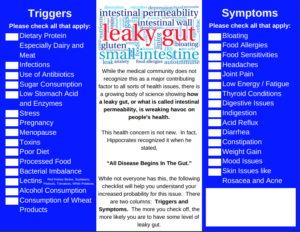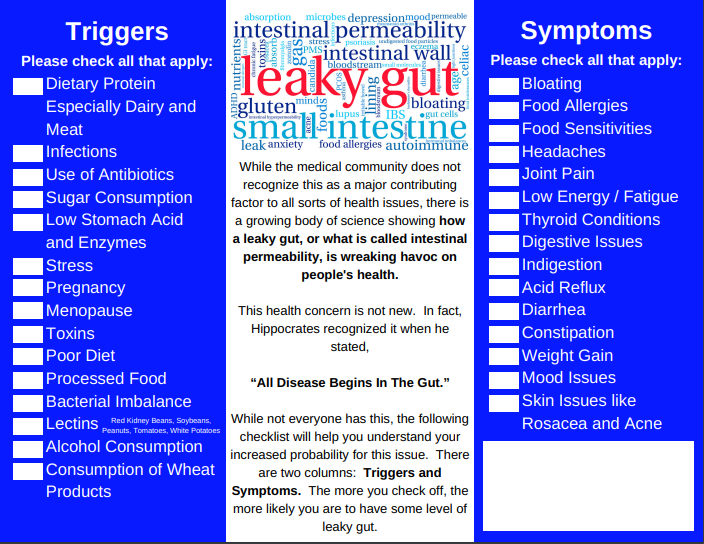In today’s blog post we want to address the question: Do you have a leaky gut?
This is a fairly new term for a medical condition called intestinal permeability. Some doctors, and medical organizations like the Canadian Society of Intestinal Research, believe this is a myth created by “alternative medicine practitioners.”
According to them “most physicians maintain that there is not enough research to prove that it is a legitimate issue.”
Then there is the Harvard Medical School that acknowledges this issue and states:
“. . . there is growing interest to develop medications that may be used in patients to combat the effects of this problem.”
Dr. Marcelo Campos, MD posted on September 22, 2017 an article for the Harvard Medical School. It was titled “Leaky gut: What is it, and what does it mean for you?” Here are two paragraphs from his article:
We all have some degree of leaky gut, as this barrier is not completely impenetrable (and isn’t supposed to be!). Some of us may have a genetic predisposition and may be more sensitive to changes in the digestive system, but our DNA is not the only one to blame. Modern life may actually be the main driver of gut inflammation. There is emerging evidence that the standard American diet, which is low in fiber and high in sugar and saturated fats, may initiate this process. Heavy alcohol use and stress also seem to disrupt this balance.
We already know that increased intestinal permeability plays a role in certain gastrointestinal conditions such as celiac disease, Crohn’s disease, and irritable bowel syndrome. The biggest question is whether or not a leaky gut may cause problems elsewhere in the body. Some studies show that leaky gut may be associated with other autoimmune diseases (lupus, type 1 diabetes, multiple sclerosis), chronic fatigue syndrome, fibromyalgia, arthritis, allergies, asthma, acne, obesity, and even mental illness. However, we do not yet have clinical studies in humans showing such a cause and effect.
Do You Have a Leaky Gut? First Some General Information
Later on this page you will find a Leaky Gut Survey to help you answer the question: do you have a leaky gut?
But first, let’s examine some of the comments made by Dr. Marcelo Campos.
He highlighted “gut inflammation” may be the main driver of this issue. He talked about the standard American diet, “which is low in fiber and high in sugar and saturated fats” as a contributing factor for gut inflammation.
As I’ve shared in other blog posts there are additional contributing factors that can create the environment for gut inflammation. They are:
-
Processed Foods
-
Alcohol
-
Medications
-
Antibiotics
-
Vegetable Oils
-
Modern Day Wheat
-
Artificial Sweeteners
And while the Canada Society of Intestinal Research doesn’t want to acknowledge any health issues associated with this problem, Dr. Campos lists the following that may be connected to a leaky gut:
-
Celiac Disease
-
Crohn’s Disease
-
Irritable Bowel Syndrome
-
Lupus
-
Type 1 Diabetes
-
Multiple Sclerosis
-
Chronic Fatigue Syndrome
-
Fibromyalgia
-
Arthritis
-
Allergies
-
Asthma
-
Acne
-
Obesity
-
Mental Illness
These two positions certainly create some confusion in this area. To help you address this issue you might want to take the Leaky Gut Survey
Do You Have a Leaky Gut? Take the Leaky Gut Survey
Below is an image of our Leaky Gut Survey. It lists certain key triggers and symptoms.
Please understand that it’s not intended to treat, cure, or determine any type of medical condition. But it will help you begin to think about this potential gut health issue.
The more items you check off, the greater your probability of having a leaky gut.

If you want to download this Leaky Gut Survey, then please click here.
While there is confusion in the medical industry about whether a leaky gut is a health factor, all of them would agree that certain changes in your diet improve your digestive and gut health.
I’ve posted previous blog articles to help you in this area.
And there will future blog articles to help you address gut health.
Leave a Reply
You must be logged in to post a comment.